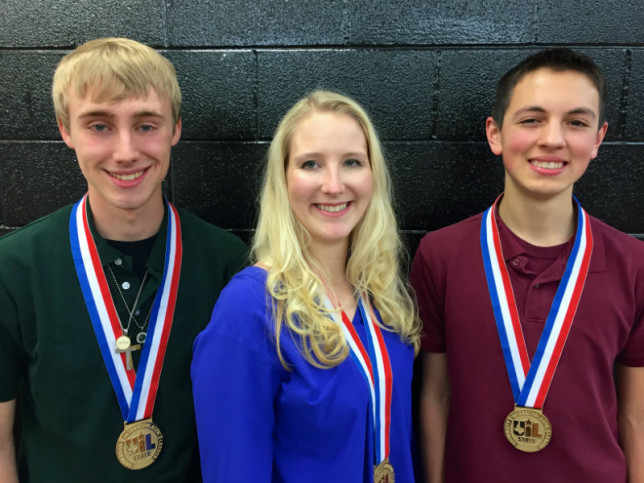
By Toni Garrard Clay/AISD Communications Specialist
It’s a three-peat! For the third year in a row — and the second by the same team — the Athens High School debate team claimed the UIL District 4A state title in CX (cross-examination) debate. The tournament started in Austin this past Friday with 60 teams. Saturday night, some eight rounds later, the team of Matthew Hernandez and True Head (or HH, as they are known to their teammates) was triumphant. All but one round were unanimous decisions for Athens.
“[The victory] felt more accomplished this year,” said Head.
“Last year, it was kind of a shock because we were both sophomores,” said Hernandez. “It was a lot more challenging this year because the teams that had been there before really grew with us.”
“I am so proud,” said AHS speech and debate teacher Nicole Cornish. “The pressure really could have gotten to them. We never talked about winning state. We just debated one round at a time, and I’m proud they were able to do that.”
“It’s about strategy and adapting to different judges,” noted Head. “It’s subjective.”
In her six years at AHS, Cornish has developed a powerhouse debate program. In 2011, Stephen Grant won silver in informative extemporaneous speaking; Sam Haynie won gold in poetry interpretation; in 2012 Quinton Johnson won gold in poetry interp; Derek Davies and Chris O’Brien were state quarterfinalists in CX debate; in 2013, O’Brien and Lauren Green won bronze in CX, and Madalyn Mikkelsen and Meridith McDonald were quarterfinalists in CX. In 2014, when the program was under the direction of Jordan Innerarity, Mikkelsen and McDonald won gold in CX, and Elizabeth Warren won silver in LD debate. In 2015, once again under the direction of Cornish, Head and Hernandez won gold in CX; and this year, aside from the team’s gold medal repeat, Hernandez also took the Silver Gavel speaker award in CX.
CX debate is a form of policy debate in which teams of two argue for or against a resolution calling for a change in federal policy. This year’s resolution calls for a substantial curtailment of the federal government’s practice of domestic surveillance. During the debate, one team presents a plan (the affirmative team) and the other argues against it (the negative team). It’s referred to as cross-examination because there is a questioning period after the first four speeches of a debate round.
